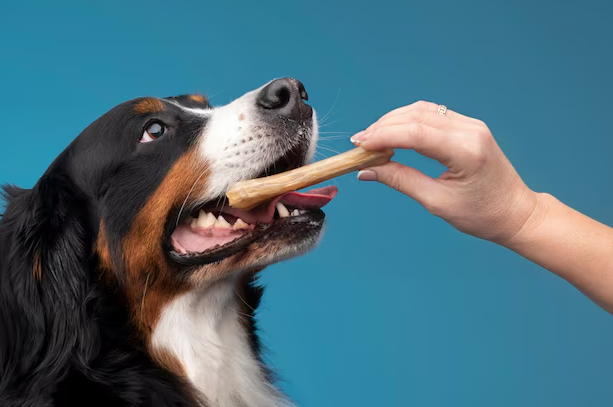
The Importance of Dog Chew Bones
As a dog owner, you want the best for your pet. You feed them the right food, give them plenty of love, and ensure they get regular exercise. But have you considered the importance of dog chew bones in your pet’s health and well-being? These simple yet essential items are not just for fun; they play a critical role in maintaining your dog’s dental health, mental stimulation, and even behavioral development.
In this comprehensive guide, we will explore everything you need to know about chew bones for dogs, from the different types available to the benefits they offer. Whether you're a first-time pet owner or a seasoned dog lover, this guide will provide valuable insights to help you make the best choices for your dog.
What Are Dog Chew Bones?
Understanding Dog Chew Bones
Dog chew bones are specially designed toys or treats that dogs can chew on to keep their teeth clean, satisfy their natural chewing instincts, and help alleviate boredom. These chew bones for dogs come in various shapes, sizes, and flavors to cater to different breeds and sizes of dogs. Chewing is a natural behavior for dogs, and providing them with the right chew bone can help redirect destructive chewing habits toward more appropriate outlets.
Types of Chew Bones for Dogs
There is a wide range of chew bones available in the market today. They come in different materials, each offering unique benefits depending on your dog’s chewing habits. Let’s break down the main types of chew bones for dogs:
-
Rawhide Chews Rawhide chews are one of the most popular options for dog owners. Made from the inner layer of cowhide, these chew bones for dogs are durable and can keep dogs engaged for hours. However, rawhide may not be suitable for all dogs, particularly those with sensitive stomachs or those who are heavy chewers.
-
Nylon Chews Nylon chew bones are designed for aggressive chewers. These long-lasting bones are made from tough, durable nylon that is safe for dogs to gnaw on. They come in a variety of flavors, including peanut butter, bacon, and chicken.
-
Rubber Chews Rubber chew bones are often softer than nylon and rawhide, making them ideal for puppies or dogs with more sensitive teeth. They are usually durable and flexible, and many come with interactive features, such as squeakers or treat-dispensing openings.
-
Edible Chew Bones Edible chew bones are made from ingredients like chicken, beef, or vegetables, and are designed to be chewed and swallowed. These bones provide a tasty treat for dogs and can also offer additional benefits like joint health or digestion support.
-
Antler Chews Antler chews are a natural, long-lasting alternative to traditional chew bones for dogs. They are typically made from deer or elk antlers and provide a good source of calcium and other nutrients. However, they can be hard and may not be suitable for puppies or senior dogs with dental issues.
The Benefits of Dog Chew Bones
1. Promoting Dental Health
One of the most significant benefits of dog chew bones is their ability to promote good dental hygiene. Chewing helps to remove plaque and tartar buildup from your dog’s teeth, reducing the risk of gum disease and tooth decay. Regular chewing on durable chew bones can help maintain fresh breath and prevent costly dental cleanings at the vet.
2. Satisfying Natural Chewing Instincts
Dogs have a natural instinct to chew. Chewing not only keeps them entertained but also helps them relieve stress and anxiety. If left unaddressed, this chewing instinct can lead to destructive behavior, such as chewing on furniture or shoes. By offering your dog an appropriate chew bone, you can redirect their energy in a more productive and less damaging way.
3. Mental Stimulation and Engagement
Chewing isn’t just beneficial for physical health—it also provides mental stimulation. Dogs that chew regularly are more likely to stay mentally sharp and engaged, which is particularly important for high-energy breeds that require frequent mental challenges. Interactive chew toys, like those that dispense treats, can keep your dog entertained for hours.
4. Reducing Anxiety and Boredom
Dogs that suffer from separation anxiety or boredom often engage in destructive chewing. Providing your dog with chew bones for dogs can help alleviate these issues by giving them something to focus on. This is especially beneficial when you need to leave your dog home alone or when they are confined to a crate.
5. Strengthening Jaw Muscles
Chewing on durable bones helps strengthen your dog’s jaw muscles. This is particularly important for larger breeds or dogs with strong chewing tendencies. Strong jaw muscles contribute to overall oral health, making it easier for your dog to bite and chew food as they grow older.
Choosing the Right Dog Chew Bone
1. Size and Breed Considerations
When selecting dog chew bones, it’s important to consider your dog’s size and breed. Smaller dogs may struggle with large, tough bones, while larger breeds may need more substantial chew toys to satisfy their chewing needs. Always select chew bones for dogs that are appropriately sized for your dog to avoid choking hazards.
2. Durability and Material
Consider your dog’s chewing strength when choosing a chew bone. Heavy chewers require more durable bones, such as those made from nylon or antler. If your dog is a light chewer, you may want to opt for softer materials like rubber or edible bones.
3. Flavors and Scents
Many chew bones for dogs come in a variety of flavors to appeal to your dog’s taste preferences. From peanut butter to beef and bacon, there’s a flavor for every dog. Choosing a chew bone with a flavor your dog enjoys will encourage them to chew for longer periods, ensuring that they reap the full benefits of the chew.
4. Health Benefits
Some chew bones are designed with added health benefits, such as supporting joint health or digestion. If your dog has specific health concerns, such as arthritis or digestive issues, consider selecting chew bones that provide additional nutrients.
Safety Tips for Dog Chew Bones
While dog bones are beneficial, there are a few safety precautions you should take to ensure your dog’s safety:
-
Always supervise your dog while they chew, especially if they are chewing on a new type of bone.
-
If a bone starts to break apart or splinter, dispose of it immediately to prevent choking hazards.
-
Choose chew bones for dogs that are specifically designed for your dog’s size and chewing strength.
-
Regularly check your dog’s teeth and gums to ensure they are not developing any issues due to chewing.
Conclusion
Providing your dog with high-quality dog chew bones is an excellent way to support their health, well-being, and happiness. Whether you're looking for a durable chew for aggressive chewers, a tasty treat for a picky pup, or a bone that provides health benefits, there is a wide variety of options available. Always ensure you choose the right size, material, and flavor for your dog’s needs, and remember to supervise them during chewing to keep them safe.
By incorporating chew bones into your dog's routine, you are investing in their long-term dental health, reducing destructive behavior, and helping them stay mentally engaged. So, treat your dog to a chew bone today and enjoy the many benefits it brings to both you and your furry friend!
FAQs
1. What are the best chew bones for dogs with sensitive teeth?
For dogs with sensitive teeth, consider using rubber chew bones or softer nylon chews. These materials provide a comfortable chewing experience without being too hard on their teeth.
2. Can chew bones help with my dog’s bad breath?
Yes, dog chew bones can help reduce bad breath by removing plaque and tartar buildup, which are common causes of smelly breath. Choose chew bones specifically designed for dental health.
3. How often should I give my dog chew bones?
The frequency of giving your dog chew bones for dogs depends on their chewing habits and size. Generally, once a day or a few times a week is sufficient to maintain dental health and mental stimulation.
4. Are rawhide chew bones safe for my dog?
Rawhide chew bones can be safe for dogs, but they should be used with caution. Always supervise your dog while chewing on rawhide, and avoid giving them pieces that are small enough to be swallowed whole.
5. What should I do if my dog swallows part of a chew bone?
If your dog swallows part of a chew bone, monitor them closely for any signs of discomfort, such as vomiting, constipation, or a decrease in appetite. If you are concerned, contact your veterinarian for advice.
